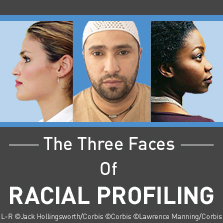Three Faces of Racial Profiling: Profiling Communities is Bad Law Enforcement


Our new website, Mapping the FBI, exposes the FBI's nationwide racial and ethnic mapping program. Looking at it, you might be surprised to learn that the FBI is forbidden from racial profiling - former Attorney General John Ashcroft banned it in 2003. However, that ban - the Justice Department's Guidance Regarding the Use of Race by Federal Law Enforcement Agencies - wasn't at all effective in stopping racial profiling. In fact, it allowed the FBI's industrial strength version of racial profiling to start because of its enormous loopholes for national security and border integrity investigations. As you can see with the FBI's racial and ethnic mapping program, the loopholes swallowed the rule.
Attorney General Michael Mukasey issued updated guidelines changing how FBI agents can investigate in 2008, authorizing the FBI to begin invasive investigations called "Assessments" without any factual basis for suspecting wrongdoing. One type of Assessment is called "Domain Management" which involves collecting and mapping racial and ethnic demographic information and "facilities" and tracking racial and ethnic "behaviors."
Deeply disturbed that the FBI claimed this authority, the ACLU submitted Freedom of Information Act requests across the country. What we found is astounding.
Like the inappropriate police scrutiny of individuals based on racial or ethnic characteristics rather than evidence of wrongdoing in traditional racial profiling cases, racial mapping leads to the scrutiny of entire communities based on racial or ethnic makeup. Racial mapping is essentially racial profiling on a much larger scale.
For instance, a Detroit FBI memorandum entitled "Detroit Domain Management," notes there are more than 40 groups designated as terrorist organizations by the U.S. State Department, many of which originate in the Middle East and Southeast Asia. It states that:
"… because Michigan has a large Middle-Eastern and Muslim population, it is prime territory for attempted radicalization and recruitment by these terrorist groups," [the Detroit FBI seeks to open a] "Domain Assessment for the purpose of collecting information and evaluating the threat posed by international terrorist groups conducting recruitment, radicalization, fund-raising, or even violent terrorist acts within the state of Michigan."
Collecting information about the entire Middle-Eastern and Muslim community in Michigan, and treating them all as suspect, is an unjust and unconstitutional violation of their civil rights and an affront to religious freedom and American values.
If there's any doubt about the purpose of Domain Management, the FBI intelligence director who started the program once showed a New York Times reporter a map of San Francisco where a "cluster" of Iranian immigrants were found, and said that's where "an FBI squad was "hunting."
As we now know from the FBI's own documents we received through FOIA, the FBI didn't stop at national security cases. We found it also looked at other crime problems that would not fit within the national security loophole in Justice Department's racial profiling ban, made rank racial stereotypes regarding the types of people FBI agents felt were involved in that type of crime, and mapped entire communities based on these stereotypes. So a crime threat from the MS-13 gang was used to justify mapping the "Hispanic" communities in New Jersey, Alabama, Georgia and California, even though the FBI knew that MS-13 included non-Hispanics.
The FBI's racial mapping program is racial profiling of entire communities, and it must be banned along with all other forms of racial profiling. It is also indisputable evidence that national security loopholes are being used to undermine the laws and guidelines designed to protect civil rights.
The Attorney General can end this problem by amending the Guidance on Race to close the national security and border integrity loopholes, and extend the ban to prohibit profiling based on religion and national origin.
A bill that would prohibit racial profiling by federal, state and local law enforcement officers, the End Racial Profiling Act, has been introduced in the Senate earlier this month and the House is likely to follow in November. Given what we know about the FBI now, it is clearly time for Congress to pass the Ending Racial Profiling Act so all Americans are treated equally under the law.
Learn more about racial profiling: Sign up for breaking news alerts, follow us on Twitter, and like us on Facebook.

